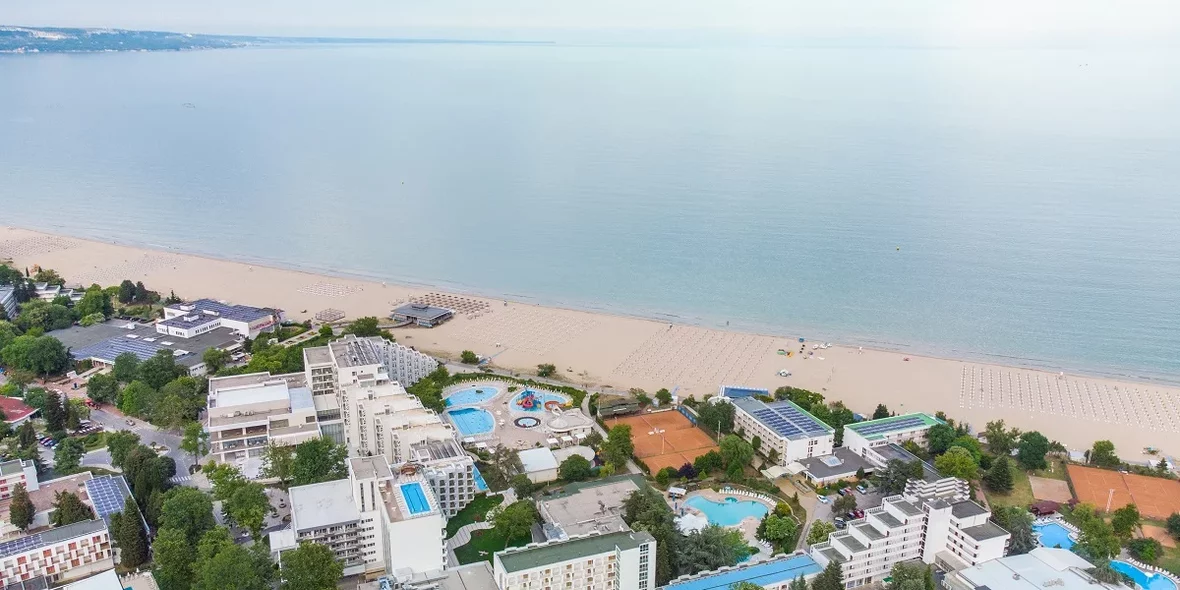
Investments in Real Estate in Bulgaria: Market Overview and Step-by-Step Guide for Buyers
Bulgaria is becoming an increasingly attractive country for investment in real estate. The combination of affordable prices, a growing market, and the prospects for European integration makes this Balkan country an interesting destination for both living and investing. In this article, we will look at the current situation in the housing market in Bulgaria, analyze trends, and provide step-by-step guidance on purchasing property in this country.
Current Situation on the Housing Market in Bulgaria
At the end of the 1-st quarter of 2024, the Bulgarian real estate market showed good results. Thus, according to the Registration Agency of the Republic of Bulgaria, in the 1st quarter of 2024, 7298 transactions were registered in the capital of the country, Sofia. It is important to say here that despite the fact that in the 1-st quarter of 2024 fewer transactions were registered than in the 4th quarter of 2023 (more than 10,000 transactions were registered then), year-on-year growth was noted — +14% compared to the 1st quarter of 2023 of the year.
A similar situation has developed in other large cities (Plovdiv, Burgas, and Varna), except for the city of Stara Zagora, where the number of transactions decreased by 3% year-on-year. Overall, the Bulgarian real estate market showed an excellent start to the beginning of the year.

The upward trend in prices does not stop. According to the National Statistical Committee of Bulgaria, the housing price index at the end of 2023 increased in all major cities. On an annualized basis, the price index growth is as follows (change in the 4th quarter of 2023 relative to the 4th quarter of 2022):
| City | Sofia | Burgas | Varna | Plovdiv | Stara Zagora |
|---|---|---|---|---|---|
| Change in general price index | +9,7% | +17,3% | +15,7% | +7,3% | +5,3% |
| New Home Price Index | +12,2% | +14,2% | +19,2% | +4,6% | +0,1% |
| Existing Housing Price Index | +7,8% | +18,6% | +14,0% | +9,9% | +7,8% |
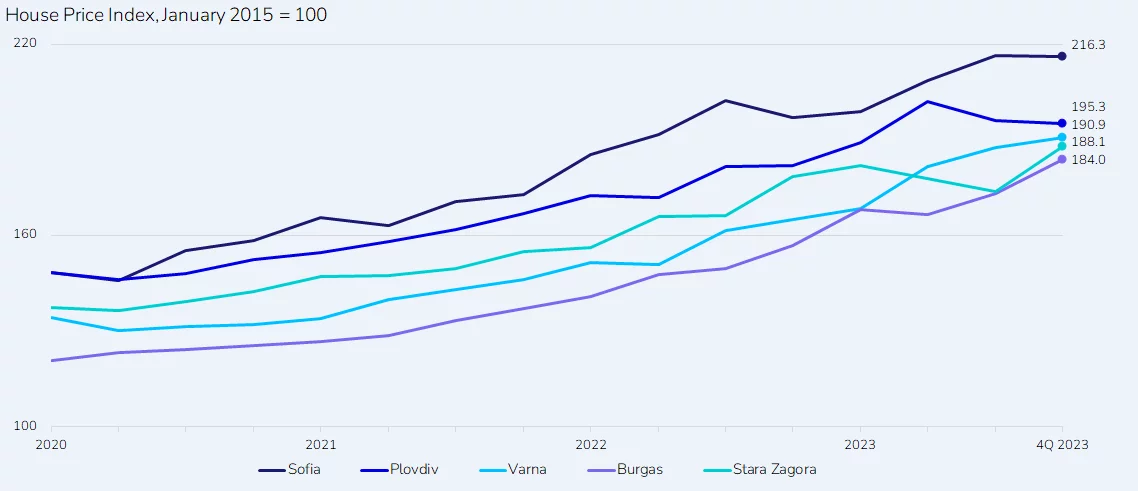
Housing market prices continue to rise in 2024, and there are no signs of this trend changing today. High demand is driving up prices in the housing market. High demand, in turn, is formed due to the following factors: rising wages among the population (according to the National Bank of Bulgaria, the incomes of the country's population are growing faster than real estate prices), low loan rates, and slowing inflation. Bulgaria's entry into the Schengen zone and the anticipation of joining the Euro zone also have an impact on price growth.
The most popular apartments among buyers are two-room and three-room apartments. The share of two-room apartments in the market structure is more than 50%, and that of three-room apartments is more than 40%.
According to the largest website on the Bulgarian real estate market, imot.bg, the average price for purchasing a two-room apartment in Sofia in the 2nd quarter of this year is 1433 EUR/sq.m, which is 7% more than a year ago. In Sofia itself, prices for two-room apartments, depending on the quality of the housing itself and its location, vary from 1000 EUR/sq.m to 2500 EUR/sq.m.
Average prices for the purchase of two-room apartments have also increased in other large cities. Below, you can see the dynamics of changes in average prices for two-room apartments in the largest cities in Bulgaria.
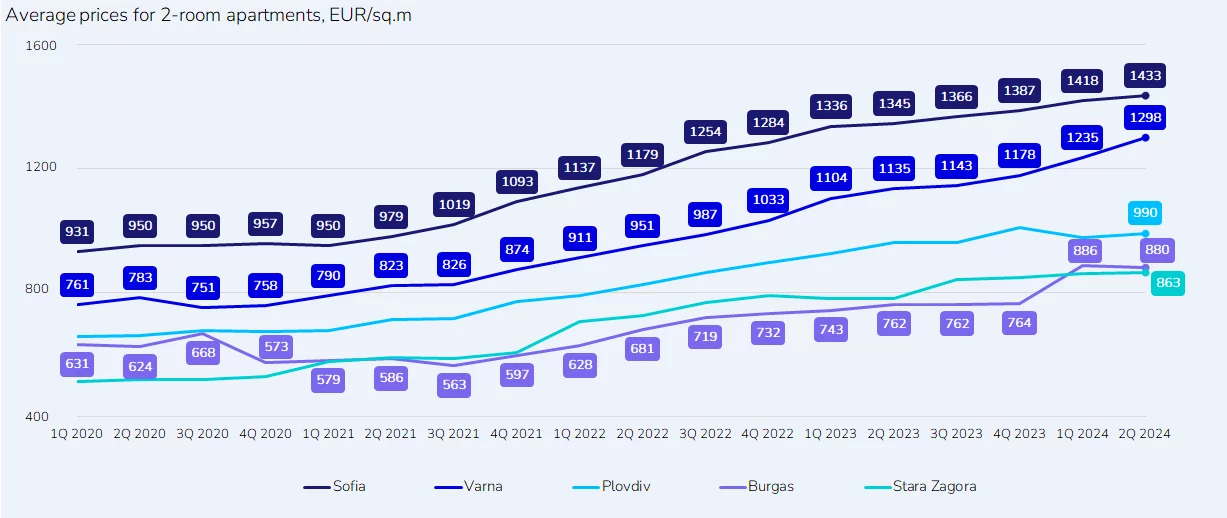
The leaders in price growth were Varna and Burgas — in these two coastal cities, apartment prices increased by 18% over the year. And this is not surprising, since buying housing in developing cities on the Black Sea coast, which also have many cultural attractions and resort areas, looks like an excellent investment not only for permanent residence but also for investment.
Average prices for one- and three-room apartments have also increased for the most part. The exceptions were two-room apartments in Plovdiv and Stara Zagora and three-room apartments in Burgas.
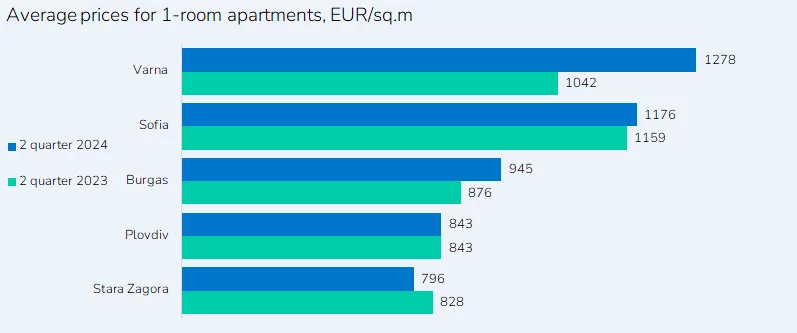
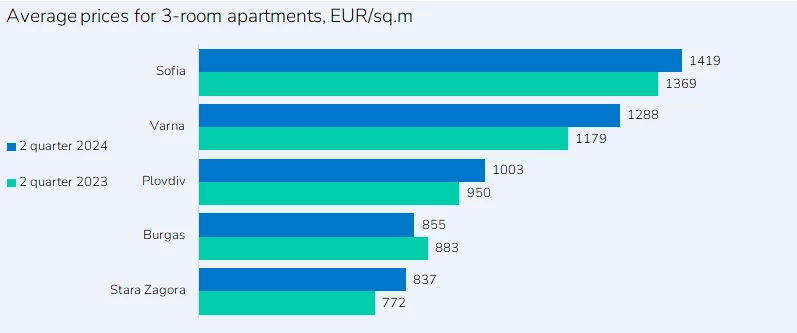
Step-by-step guide for purchasing property in Bulgaria
What to do before purchasing:
1. Open a bank account.
Everything is clear here: from this account, you can pay for the property and cover all additional fees.
Note. Russians without a residence permit cannot open accounts in Bulgaria. However, buyers can transfer funds directly to the account of the seller or developer in a third country.
2. Choose and reserve a property.
To reserve a property, you need to make a deposit, which, as a rule, does not exceed €3 thousand. The deposit is transferred to the agency's account based on the reservation agreement, is included in the total cost of the property, and remains with the agency until the transaction is completed.
3. Sign the preliminary agreement and draw up a notarial deed.
After paying the deposit, it is necessary to conclude a preliminary agreement with the owner within 30 days. This agreement establishes the basic conditions, which are then transferred to the notarial deed. Among the specified conditions are a description of the property, price, payment terms, and, for unfinished properties, the completion date of construction.
Then, a local notary, in the presence of the buyer and seller, draws up a notarial deed (Title Deed), which is considered a legal document certifying ownership of the property.
4. Pay for the transaction.
Typically, after signing the notarial deed, the buyer immediately transfers the remaining amount to the seller's account. Additional fees are also due at this time.
Please note that cash payments are prohibited for any transactions whose value exceeds 10 thousand BGN (€5 thousand).
5. Register ownership.
After the transaction is concluded, the notary transfers the documents to the district court, where new data is entered into the state register. Within a week after this, the buyer receives a deed from the notary's office with a mark on the registration of ownership.
It is important for legal entity buyers to note that a week after receiving the notarial deed, they need to register in the system of the Bulgarian National Statistical Institute. Registration of property with the tax office is carried out automatically upon transfer of ownership.
Additional costs when purchasing property in Bulgaria
Associated expenses when buying a home in Bulgaria amount to 3–11% of the transaction amount. These are the fees:
- Property transfer tax – 0.1–3%. The exact figure depends on the region where you purchase the apartment.
- The notary fee depends on the transaction amount, usually equal to 0.1–1.5%.
- The registration fee is 0.1%.
- The agent's commission ranges from 2.5–6%. The share that the buyer must cover will be specified in the contract.
Buying a home in Bulgaria with a mortgage
Citizens and resident foreigners in Bulgaria are willing to lend, but banks often refuse mortgages to foreigners without a residence permit. This is especially true for those foreigners who cannot prove a close connection with Bulgaria and do not have income on its territory. The fact is that such borrowers are considered a higher risk to lenders and may face higher interest rates and larger down payments (30-40%).
People who work in Bulgaria or in EU countries and have a confirmed legal income have more opportunities to get a loan. Also, the chances increase for those who receive stable and legal income from other sources, regularly pay taxes, have a positive credit history, and are already the owners of real estate in Bulgaria.
Interest rates on mortgages in Bulgaria range from 6.25 to 14%. It's important to note that interest rates can change over time, so you should check directly with your banks or mortgage brokers for the most up-to-date information.
What to expect from the Bulgarian housing market in the future?
The first quarter of 2024 set an excellent start for the Bulgarian housing market — strong demand from buyers continued to push prices up. The second quarter has not yet ended, but it can already be assumed that the number of registered transactions will exceed the value of the 1-st quarter.
Prices will continue to rise, and this is unlikely to be a surprise for anyone. The positive economic situation in the country confirms this: as mentioned earlier, factors such as rising wages among the population, low loan rates, a slowdown, and a reduction of inflation (and this is one of the conditions for Bulgaria’s admission to the Euro zone) will have a positive impact on rising prices.
At the end of March, Bulgaria entered the Schengen zone, and in 2025, Bulgaria is expected to join the Euro zone. This already creates excellent conditions for attracting investment in real estate from abroad, because prices in Bulgaria are an order of magnitude lower than in other European countries. It is important to note here that this will necessarily affect the rise in prices.
We can safely say that Bulgaria looks attractive both from the point of view of purchasing real estate for living and from the point of view of investment.
Overall, 2024 is expected to be another successful year for the Bulgarian housing market.
















